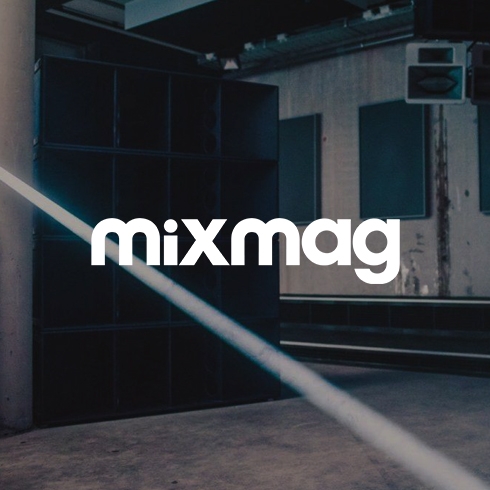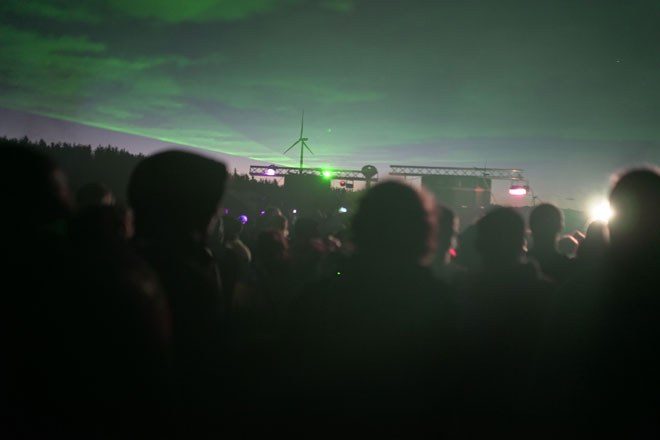
3000 people attend Bank Holiday rave despite threat of £10k fine
The rave took place in the Brecon Beacons in Wales and was one of a number of illegal parties that happened at the weekend
by Wil Crisp & Karla HunterIt’s 4.30am on Sunday 30 August in the peripheries of the Brecon Beacons in south Wales and the boom of Bristol-made raggatek is drifting over miles of sparse pine trees and winding gravel tracks.
In a clearing halfway up a mountainside, in front of four interlinked, monolith-like speaker stacks a writhing mosh pit is erupting.
More than a thousand people are being pummelled by cascading amen breaks, pounding kicks and rumbling bass as a remix of Beenie Man and Mya’s ‘Girls Dem Sugar’ blasts out of the soundsystem.
Revellers are sweating, embracing, and tumbling over each other on the dancefloor.
Read this next: People are breaking lockdown to attend illegal raves
This is one of six makeshift stages, each with giant sound systems, set up in clearings across the area.
They've been constructed by dozens of free party crews from across England and Wales that teamed up to put on a weekend-long outdoor August Bank Holiday rave dubbed The Great British Teknival, despite recently introduced legislation that increased penalties for organisers of unlicensed music events.
Texts circulating before the weekend promised that the rave would be the biggest free party of the year with more than fifty crews combining their efforts and equipment.
More than 3000 revellers were drawn to the remote Welsh location near the village of Banwen late on August 29.
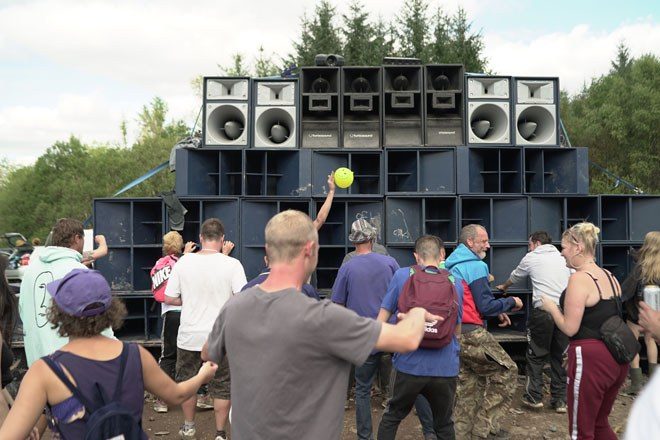
The crowd includes punks, students, factory workers, tradesmen, NHS workers, new age travellers, old hippies wearing hemp dresses, and young teenagers in tracksuits.
As Mandidextrous and Mooreman’s pounding raggatek classic ‘Roll The Selection’ sparks hysteria on the dancefloor a skinny teenager wearing a poncho scrambles to the top of one of the speaker stacks.
Standing on top of the cabinets he stretched his arms out wide and his poncho blazes with colour from spinning lights and lasers.
Near the back of the dancefloor, a woman wearing a blue Adidas tracksuit and a Vietnamese-style conical straw hat is sitting cross legged on the grass, seemingly meditating amid the chaos.
Nearby, a man with his shirt off is glistening with sweat as he rapidly whirls a flaming staff around him in time with the booming tekno kick.
Cars and vans are parked haphazardly around the peripheries of the clearing in the woods, with some becoming engulfed by the swelling dancefloor as the night progresses.
Read this next: We went to Bangface, the final rave before the world stopped dancing
This unlicensed rave, and another that occurred the same weekend in Norfolk, came at a time of transition in Britain.
On August 30 the UK recorded one official coronavirus death down from a peak of 1,224 in a single day recorded on 21 April.
As the death rate has declined, Boris Johnson has encouraged people to return to their workplaces. Eating out has been subsidised to encourage people to return to dining in restaurants and plans are in place for millions of students to return to school for the first time since the pandemic began.
While the police condemned the rave in Wales as “irresponsible” many of those in attendance see the event as part of the process of returning to a more normal way of living.
“It depends on your values,” says Maria, a factory supervisor who travelled for three hours to attend the event in Wales.
“The government thinks it’s an acceptable risk for workers to cram themselves into the tube every day going to work in London to make money and pay tax – but if people get together to enjoy music with each other in the countryside they class this behaviour as unacceptable.
“I don’t share the same values as the government on this issue.”
“The rules change every week,” adds a friend of Maria who is wearing a blue dress and holding a hula hoop.
“Half of the rules don’t make any logical sense. And it’s been demonstrated that the rich and powerful: people like Dominic Cummings can do whatever they like without anything happening to them.”
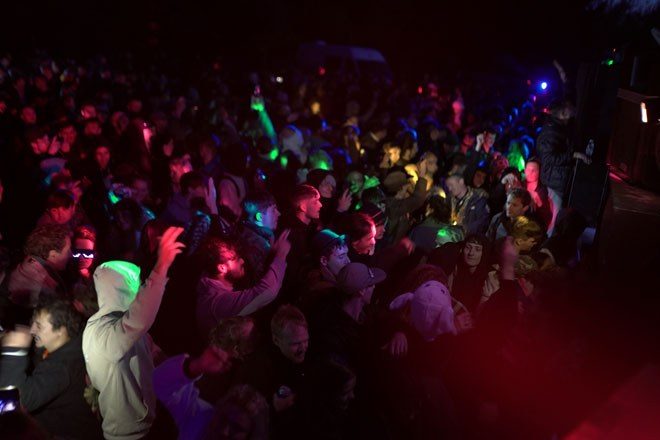
The closure of night clubs in the UK due to the Covid-19 pandemic has led to a new wave of, generally smaller, illegal parties set up by entrepreneurs that are usually operating with low quality soundsystems and looking to make fast money by filling a gap in the market.
Often the nights they put on attempt to emulate the experience of going to a legitimate nightclub and charge high prices for entrance and drinks.
For those that were involved in the UK’s underground free party scene prior to the pandemic – and are looking for something that is more like a genuine alternative to commercial clubs and festivals rather than an illegal replica of the normal club scene – 2020 has been a quiet year.
After the introduction of lockdown in the UK on 16 March most of the illegal party sound systems that were active prior to the Covid-19 pandemic stopped putting on parties due to concerns about the spread of the virus and several large-scale regular underground unlicensed events, which are usually attended by thousands of revellers, were cancelled.
These include UK Tek, which normally takes place during May and in 2019 took place on a wind farm in Scotland’s Ae Forest, and Egg Tek, which regularly takes place in April.
Read this next: Get lost in dance music's past with the Rave Archive
The general resumption of normal activities by some of the UK’s pre-Covid illegal rave crews was marked by the Return of Scumerset, which took place this year in late July and saw 3,000 people descend on an abandoned RAF airfield near Bath for a free party that started on Saturday night and lasted late into Sunday afternoon.
“I haven’t been out much since lockdown,” says John, an archaeology student who is among a group of friends from Salisbury who are soaking up the music and the early morning mountain scenery. “There just haven’t been many proper free parties this year.”
“There were more big illegal raves in 2019 compared to this year. But this year the media has constructed a narrative around raving during the pandemic and the police are branding every single house party that they shut down as an illegal rave."
As night becomes morning the raggatek transitions into jungle with warm buzzing basslines and, as the sun rises over wind turbines dotted across green rolling hills to the east of the party, a pale orange light spills across the dancefloor.
Just a couple of hundred metres away, in another larger opening in the trees there is an even bigger wall of speaker cabinets positioned amid a sprawl of camper vans and bell tents.
This soundsystem is pumping hard trance into a crowd of hundreds of ravers and across a pristine Welsh valley behind them that is bathed in early-morning light.
Higher up the mountain in a gravel car park, a couple of towering speaker stacks are kicking out acid techno for revellers that are gathered inside a horseshoe of parked cars.
As the sun rises higher in the blue sky on Sunday morning ravers strip off their jumpers and shirts as they dance in the heat and a couple of partygoers swim naked in a small lake nearby.
A man in a flat cap with dreadlocks wanders through a mass of dancers being pounded by hard trance handing out berries and packets of fizzy white sherbet with sticks of liquorice.
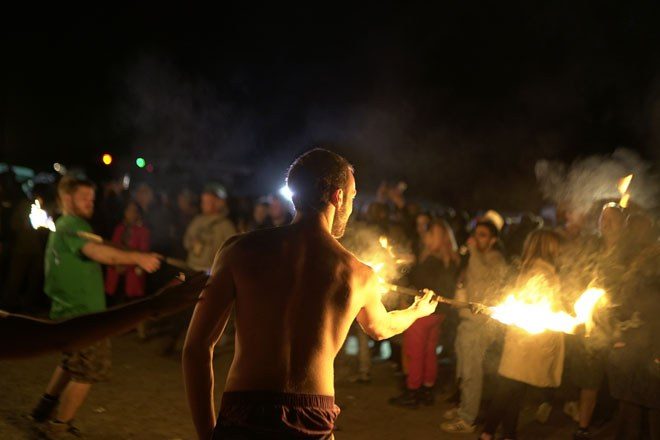
While the death rate has been dramatically reduced since the initial peak in Britain, experts have warned that the UK is still in danger of seeing a significant second wave of coronavirus cases if measures, like social distancing, aren’t kept in place to reduce transmission.
A study published in August by University College London and the London School of Hygiene and Tropical Medicine found that, in certain scenarios, it was possible that the UK could see a second spike that would peak in December 2020 and could be more than double the size of the original wave.
One of the study’s authors said the research should be taken as “a loud call to action” to improve the UK’s existing test-and-trace system, which has been heavily criticised after being hit by delays and home test kit failures.
And music events have already been directly connected to outbreaks of Covid-19 in other countries, showing that a single person can infect dozens of others when they are moving through crowded spaces without social distancing.
In May, South Korea scrambled to contain an outbreak of the virus after a cluster of more than a hundred cases was linked to one man who visited several Seoul nightclubs.
In response to concerns about illegal parties taking place during the pandemic, on August 28 new laws were put in place across England and Wales so that £10,000 fines could be enforced on anyone found to have organised an unlicensed music event (two organisers of The Great British Teknival have reportedly been issued with the fine by police, with 22 others identified as involved with the party). The new rules also introduced £100 fines for anyone caught attending an event.
In an article for The Daily Telegraph, Home Secretary Priti Patel defended the legislation saying that in London, the Metropolitan Police had responded to more than 1,000 unlicensed events since the end of June and called illegal gatherings "the most serious breaches of social distancing restrictions".
Her claims have been countered by some within the illegal rave community who say that the rave scene is being used as an easy scapegoat by a Tory government that has made dozens of errors and policy U-turns as it has struggled to contain the virus.
The new laws targeting mass gatherings, which were initially announced on 23 August, sent shockwaves through the new wave of entrepreneurial party organisers that started operations during the pandemic leading to dozens shutting promotional Instagram accounts and cancelling planned events.
Read this next: Tempio Del Futuro is a squat rave like no other
But, so far, the new law has generally been shrugged off by more experienced crews that were active before the pandemic.
“Putting on illegal raves has always been a gamble,” says one crew member as he sits in the sun next to a white panel van that has been converted into a camper.
He says his crew recently lost its soundsystem after an outdoor party of less than 50 people was raided by more than 80 police officers using five police vans, two police cars and a four-wheel drive vehicle.
“This isn’t about money. The threat of a £10,000 fine is bad, but the UK free party scene has always dealt with threats.
“Soundsystems can cost tens of thousands of pounds and every time you take it out you are at risk of losing it.”
Many within the UK’s free party community believe that the decentralised nature of the scene means that it will be difficult for authorities to enforce the new legislation in any kind of fair or just way.
“The organiser is meant to be the one that gets the fine – but really there is no organiser,” says the crew member.
“People are coming together to play each other music and dance. Some people bring sound equipment. Others bring food or bring records and DJ.
“No one is making money here. It’s a free event. Anyone is welcome to attend and, really, it’s one of the most disorganised things I’ve ever seen.”
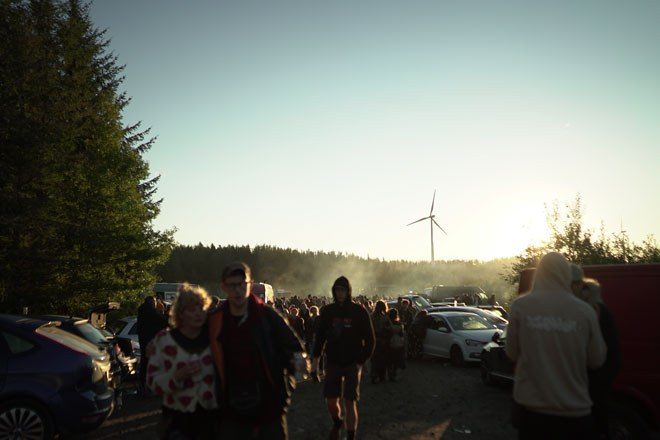
As Sunday evening draws in and the sun sets the party morphs as some soundsystems are partially disassembled and others are constructed, springing up in unexpected places.
On one of the newly assembled soundsystems a group of girls take turns MCing as a DJ wearing a black T-shirt and glasses concentrates on mixing bassline records for an increasingly raucous crowd of dancers.
Elsewhere people are sleeping in sleeping bags on the grass or sitting next to fires, eating, smoking and enjoying the mountainous Welsh scenery.
In one of the clearings in the woodland a large barbeque has been set up where ravers are cooking up burgers and sausages, wrapping them in fresh baps and giving them away to anyone who is hungry.
Some of those eating burgers are exchanging rumours about the police, who have erected blockades at all the roads leading in and out of the party and are subjecting some people to drug swab tests.
Read this next: Junior Tomlin is the Salvador Dali of rave art
One of the topics of discussion is the new legislation for mass gatherings and how it might impact future parties - and the mood is generally optimistic.
“Parties like this have been part of British life for too long now,” says one raver wearing a bright yellow tracksuit as he slots a burger into a white bap.
“The Criminal Justice Act didn’t stop it in the 90s and it’s hard to see this law stopping it either. Sound system culture just runs too deep.”
Read this next: Get the best of Mixmag direct to your Facebook DMs
Mixmag Weekly
Get closer to dance music. Sign up for the Mixmag newsletter
Sign me up!
